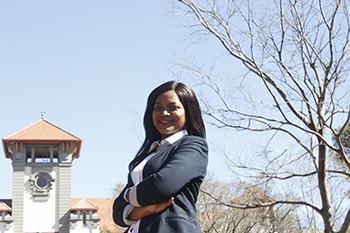
Akhona Monakalali to take on the business world.
Photo: Rulanzen Martin
Whoever came up with the idea that ‘a woman’s place is in the kitchen’, has definitely not met Akhona Monakalali. Monakalali, a postgraduate student busy with an Accounting diploma on the Bloemfontein Campus of the University of the Free State (UFS), is a force to be reckoned with. She was born in Katlehong Township in Gauteng, and moved to Aliwal North in the Eastern Cape a few years later.
Making international waves in business
Monakalali is a Professional Accountant and an entrepreneur who continues to make her mark in the entrepreneurial world. She just recently participated in the Progressive African Network’s (PAN) Annual African Entrepreneurship Expo in Boston, USA, which was hosted by PAN and the Hult Women in Business Club. She was invited to the expo to share her insights on entrepreneurship in South Africa. “I and four other Africans participated in the expo via Skype. It was a very successful event and very insightful,” she says.
Awarded for positive contribution in communities
While she was doing her undergraduate degree, she was elected as the President/CEO of the Golden Key UFS Chapter in 2007. After competing with other universities in the national championships, they won and qualified for the Students in Free Enterprise (SIFE) World Cup in New York City. SIFE is an international non-profit organisation working with university students who want to change their communities positively, and gain practical knowledge to become socially responsible business leaders.
This international acknowledgement influenced her peers – among millions of other South African teens – to vote for her in the Seventeen Magazine’s Top Teen Achiever Award for her community contribution. Later in that same year, she received a special Service Leadership Award from the Dean of her faculty for her contribution towards creating a better world through business.
She has since established an in-home tutoring foundation called Monakali Academy, which offers parents and struggling students affordable, one-on-one tutoring in the comfort of their homes.
“Tutoring is performed in the student’s home in order to provide a comfortable and non-competitive environment for learning,” says Monakalali.
She will also be involved with various entrepreneurs throughout Africa, working on ways to improve youth entrepreneurship on the African continent.